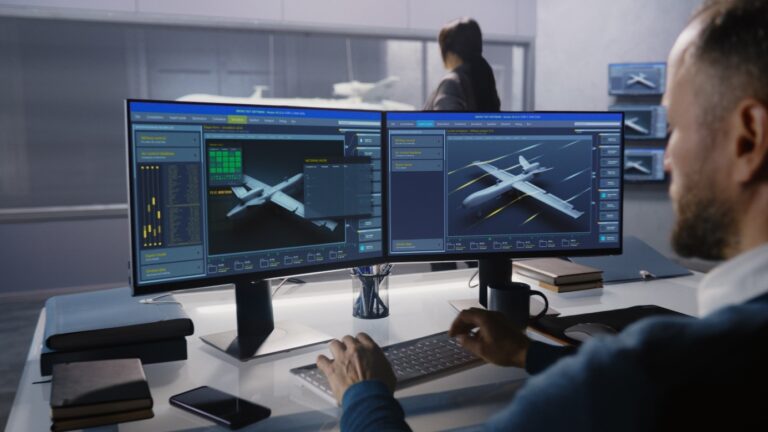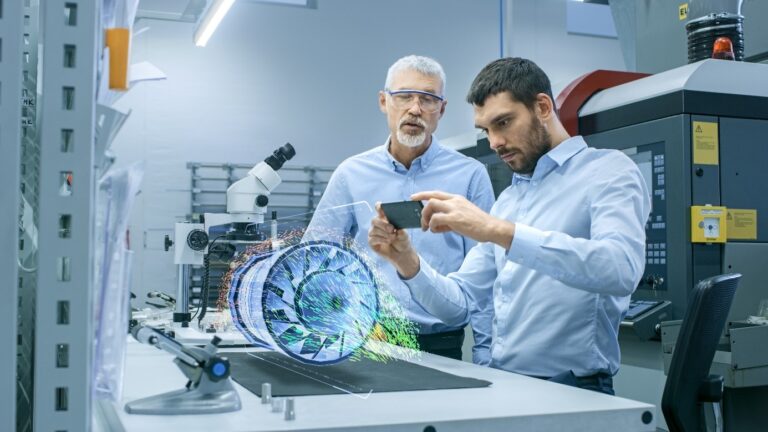Transforming Engineering with Artificial Intelligence and High-Performance Computing

In today’s rapidly evolving research and engineering landscape, the convergence of artificial intelligence (AI) and high-performance computing (HPC) has become a transformative force. The synergy of AI and HPC is reshaping industries such as manufacturing, automotive, energy, aerospace, and climate research. From designing smarter vehicles to enabling sustainable energy sources and improving aerospace precision, AI and HPC are making engineering smarter, safer, and more sustainable. In this blog post, we will provide some insight on applications of AI and HPC in some engineering sectors including our own EXCELLERAT approaches.
AI-Powered Design Optimization in the Automotive Industry
The Automotive Revolution:
For engineers, the challenge is not just to design vehicles but to design them with energy efficiency, safety, and intelligence in mind. The automotive industry is on the brink of a revolution with the advent of electric vehicles and autonomous driving. As seen in the case of Tesla’s Autopilot system, regular updates and reports demonstrate the success of advanced driver assistance systems (ADAS) and autonomous driving. And not just Tesla, also European-based companies have been pioneering innovations in AI-driven autonomous vehicles. AI with HPC simulation support is the driving force behind this transformation. Utilisation of HPC resources to simulate real-world driving scenarios enhances safety and efficiency. By running these complex simulations with HPC’s computational muscle, engineers can assess the impact of AI-driven features like ADAS and autonomous driving without the time and cost of field testing [1]. This innovation is not just about moving us from point A to B; it’s about making our roads smarter and safer.
Accelerating Materials Research in the Energy Sector
Fuelling the Future:
In the energy sector, the search for cleaner and more efficient energy sources requires advanced materials and techniques. AI, in tandem with HPC, is at the forefront of this search. Using AI algorithms, researchers can predict material properties and build digital twin representations of an industrial environment that people can interact with, drastically speeding up the material discovery process. European research institutions and companies are at the forefront of accelerating the material discovery process using AI and HPC. Experiments such as ITER (International Thermonuclear Experimental Reactor), a fusion research facility in France, leverage AI and HPC for nuclear fusion research. Using large-scale HPC systems optimised for AI and Machine Learning, they can improve the communication between exascale computers running large scale simulations and large-scale experiments [2]. These innovations demonstrate the significant potential of AI and HPC to impact energy and material research.
Precision in Aerospace Engineering
Aerospace engineering demands meticulous precision. A minor error could lead to catastrophic consequences. This is where AI and HPC become indispensable in order to save costs and time otherwise spent for field testing. Engineers employ AI-driven simulations and HPC resources to ensure the structural integrity and safety of aircraft. NASA’s simulations are a testament to the critical role of AI in aerospace design and the safety of their space missions. DLR (the German Aerospace Center) also employs AI and HPC in its aerospace research. They use advanced simulations and high-performance computing to optimise designs and ensure the structural integrity of aircraft so that every flight is a safe journey into the skies [3].
Weather prediction and Climate Research for a Sustainable Future
Climate research is critical in a world facing unprecedented environmental challenges. Researchers analyse historical data, predict future climate trends, and develop strategies for mitigating climate change. Such complex climate models and simulations are powered by immense computational power, courtesy of AI and HPC [4].
Utilising advanced HPC resources coupled with cutting-edge AI algorithms is also necessary where the mission is to provide accurate and timely forecasts and reanalysis data for medium-range weather predictions. For monitoring and predicting extreme weather events, the European Centre for Medium-Range Weather Forecasts (ECMWF) uses advanced HPC and AI, since the simulations without these technologies would either have a very low resolution or take too long to run to be useful in making predictions. The centre’s forecasts assist European nations in preparing for and mitigating the impact of storms, heatwaves, and other extreme conditions, which are becoming more frequent due to climate change.
Conclusion
The future of engineering is marked by the seamless integration of AI and HPC. These technologies, in synergy with AI, not only accelerate innovation but also empower engineers to solve complex challenges. By designing smarter vehicles, discovering materials for clean energy, ensuring precision in aerospace, and fighting climate change, AI and HPC are driving us toward a smarter, safer, and more sustainable future.

—Jernej Cucek, Arctur d.o.o.
Sources:
[1] The Automotive Revolutionhttps://ts2.space/en/high-performance-computing-in-the-automotive-industry-designing-safer-and-more-efficient-vehicles/
https://www.quest-global.com/resources/the-dawn-of-software-defined-vehicles-unveiling-the-synergy-between-adas-and-high-performance-computing/
[2] Fuelling the Future
https://www.hpcwire.com/2022/09/02/using-exascale-supercomputers-to-make-clean-fusion-energy-possible/
https://www.hpcwire.com/2019/08/07/supercomputer-powered-ai-tackles-a-key-fusion-energy-challenge/
https://www.neimagazine.com/news/newssupercomputing-and-ai-to-deliver-digital-twin-of-the-uks-step-fusion-powerplant-10984080
[3] Precision in Aerospace Engineering
NASA: https://ntrs.nasa.gov/api/citations/20190032032/downloads/20190032032.pdf
DLR: https://www.hpcwire.com/2022/07/20/german-aerospace-center-launches-caro-supercomputer/
https://www.dlr.de/en/research-and-transfer/featured-topics/artificial-intelligence/ai-improves-the-safety-and-efficiency-of-aircraft-design
[4] Weather prediction and Climate Research for a Sustainable Future
Researching Complex climate models with simulations: https://youtu.be/Qvuj6lFAo_Q?t=2168
ECMWF: https://www.ecmwf.int/en/computing
